 One of the things for which Numenera (and the Cypher system as a whole) is rightfully lauded is how easy it is for the GM to prep material for the game. The cornerstone for this is creating stats for NPCs: You can literally just say, “He’s level 3.” And that’s it. You’re done. By assigning that single number, you know everything you need to know in order to run the NPC.
One of the things for which Numenera (and the Cypher system as a whole) is rightfully lauded is how easy it is for the GM to prep material for the game. The cornerstone for this is creating stats for NPCs: You can literally just say, “He’s level 3.” And that’s it. You’re done. By assigning that single number, you know everything you need to know in order to run the NPC.
(In this, Numenera is actually quite similar to older editions of D&D, where assigning a Hit Die to a monster was basically 95% of what you needed to do. But Numenera streamlines the process even further.)
This is nice for pre-game prep, but where it really empowers the GM is during play: If the PCs go somewhere unexpected, it’s trivial to keep up with them. If you have a cool idea for a creature, you don’t need to table it until you have time to stat it up. The creative act of adding a character to the game world is closely wedded to the act of realizing that idea mechanically.
Experienced GMs will, as they get comfortable with a system, figure out how to improvise stat blocks no matter how complicated they are: They’ll know the key stats they need to decide up front, and they’ll learn the various options well enough that they can sort of lay them in on-the-fly. For example, when I’m running D&D 3rd Edition I’ll jot down the skill point total for an improvised NPC and basically “spend” them when it feels appropriate for the NPC to have a particular skill. You can do something similar with spellcasters and their spell lists. What you can see here is that Numenera basically gives even brand new GMs the same ability that experienced GMs need to spend time mastering in more complicated systems.
So why would anyone choose a more complicated system? Why wouldn’t every game go with a simple “pick one number and you’re done” approach?
Because complexity can be leveraged to make the game cooler. It’s basically the same reason that every board game isn’t “roll 2d6 and race each other around a board with blank space.” Simulationists appreciate being able to make more detailed or consistent mechanical models. Gamists appreciate the variety of tactical challenges varied stat blocks can create. And so forth.
FRACTAL NPCs
Okay, so Numenera trades the advantages of complexity for the advantages of simplicity.
Well… not quite. Because this is where Numenera does something very clever, in a way that is often overlooked as people focus on its really fantastic “easy prep” features: When you’re statting up an NPC, you don’t have to stop after saying, “Level 3.” You can keep adding layers of mechanical detail. You could give a Numenera NPC as much detail as a D&D 4th Edition stat block — replete  with differentiated skills and a grab bag of special abilities — and the system lets you seamlessly do that. (And, importantly, provides just enough mechanical structure so that these additional details are mechanically relevant.)
with differentiated skills and a grab bag of special abilities — and the system lets you seamlessly do that. (And, importantly, provides just enough mechanical structure so that these additional details are mechanically relevant.)
The way this works is that “level 3” remains the baseline for the NPC, and everything else is an exception to that baseline.
You can get a good sense of the different ways you can push (or choose not to push) the system by looking at the creature stat blocks in the core rulebook or the Ninth World Bestiary. But you can actually push it even further than that: You see value in having an NPC with a different rating in thirty different skills? You can do that. And just because you do it with one NPC, it doesn’t mean you need to do it with the next NPC.
I’ve come to think of this as the Numenera stat block being “fractal” in nature: The closer you look at it, the more detail you can see. And what’s interesting is that it can also be selectively fractal; you can look for more detail in one aspect of an NPC, while allowing other aspects of the NPC to simply default to a broader and simpler structure.
You may notice that this also neatly formalizes what the experienced GM described above is doing an informal fashion: Starting with a broad definition of what the character is capable of and then selectively adding detail (specific skills, specific powers, etc.) as desired and/or needed.












“If the PCs go somewhere unexpected, it’s trivial to keep up with them.” This is such an unsung part of the Cypher System, as is the fact you can simply strip away or add to it incredibly easily, even over the course of play.
Do you think the Cypher System could be taught in ‘stages’ for new roleplayers or a school club? Perhaps you could start with the core resolution mechanic, then add in Type, Descriptor and Focus over the course of play?
I wrote up some similar thoughts a while back:
https://www.montecookgames.com/make-a-creature-in-10-minutes-or-less/
I have not played Numenera or the Cypher System. Is there a way to use this same system to create player characters? If not in this system, is there another system that can do this? I would LOVE to have a system that I could bring to mixed groups of players where the characters reflected the experience of the individuals.
To the new players, you say, “You are level 3.”
To the slightly more experienced players, “You are level 3, and you have these few more mechanical details.”
To the very experienced players, “You are level 3, and you have this list of 25 mechanical effects because you know how to use them.”
Can it be done?
Sarainy, that’s basically what No Thank You Evil, the RPG aimed for kids that is derived from Cypher System do.
Based on the age and experience of the players, their characters have different level of complexity.
Using Cypher System concept, they start as simple “Type”, then can be “Descriptor Type” and then finally “Descriptor Type who Focus”.
There’s an other RPG that does it well, it’s the Cortex Plus system. More specifically the Firefly RPG (not to confused with the Serinity rpg based on the Cortex system)
Fate explicitly takes this approach to prep with the Fate Fractal, aka the Bronze Rule:
https://fate-srd.com/fate-core/extras#the-bronze-rule-aka-the-fate-fractal
The rules is phrased as “In Fate, you can treat anything in the game world like it’s a character. Anything can have aspects, skills, stunts, stress tracks, and consequences if you need it to.”
However, what this really means in practice is that a single enemy doesn’t need to be a fully-statted “character” unless you need it to be. It can be an Aspect on a scene or a setting that can be invoked or compelled to accomplish various mechanical effects (e.g., “The doorway has the Aspect Guarded by Two Giant Wolves, so I’m going to invoke that to raise the difficulty of sneaking through by +2”). It can be a set difficulty number for accomplishing something in a scene (e.g. “The merchant is pretty wily, so you’ll need to beat passive opposition of 3 to convince him to buy your stolen goods”). It can be a character with no mechanical traits other than one or more skills (e.g. “Guarding doorways +3”), or with one or more Aspects (e.g. “Keen Sense of Smell”), or whatever other level of detail you want.
And the fractal nature of this rule means that a character with an Aspect “Member of the Golden Hand Society” can at some point stat up the Golden Hand Society as a character, and then can stat up specific offices or members of the Society as characters, and so on.
Very interesting! I run a lot of “lite” freeform games for kids, and this is about how I do it. Since the kids are new, I just tell them what to roll – after all, I have a good idea what, say, a level one cleric is capable of. If they want, I let them customize their PCs with a few skills, but that doesn’t mean they can’t do anything else expected of their class. (They also have all the obvious equipment.) If I build a WWII soldier, obviously he knows how to handle a rifle and drive a jeep, and obviously he has a uniform and helmet. But he could also have a +1 in cooking or marksmanship at the same time that he still has basic skills in tossing grenades. It’s easy to prep and easy to play.